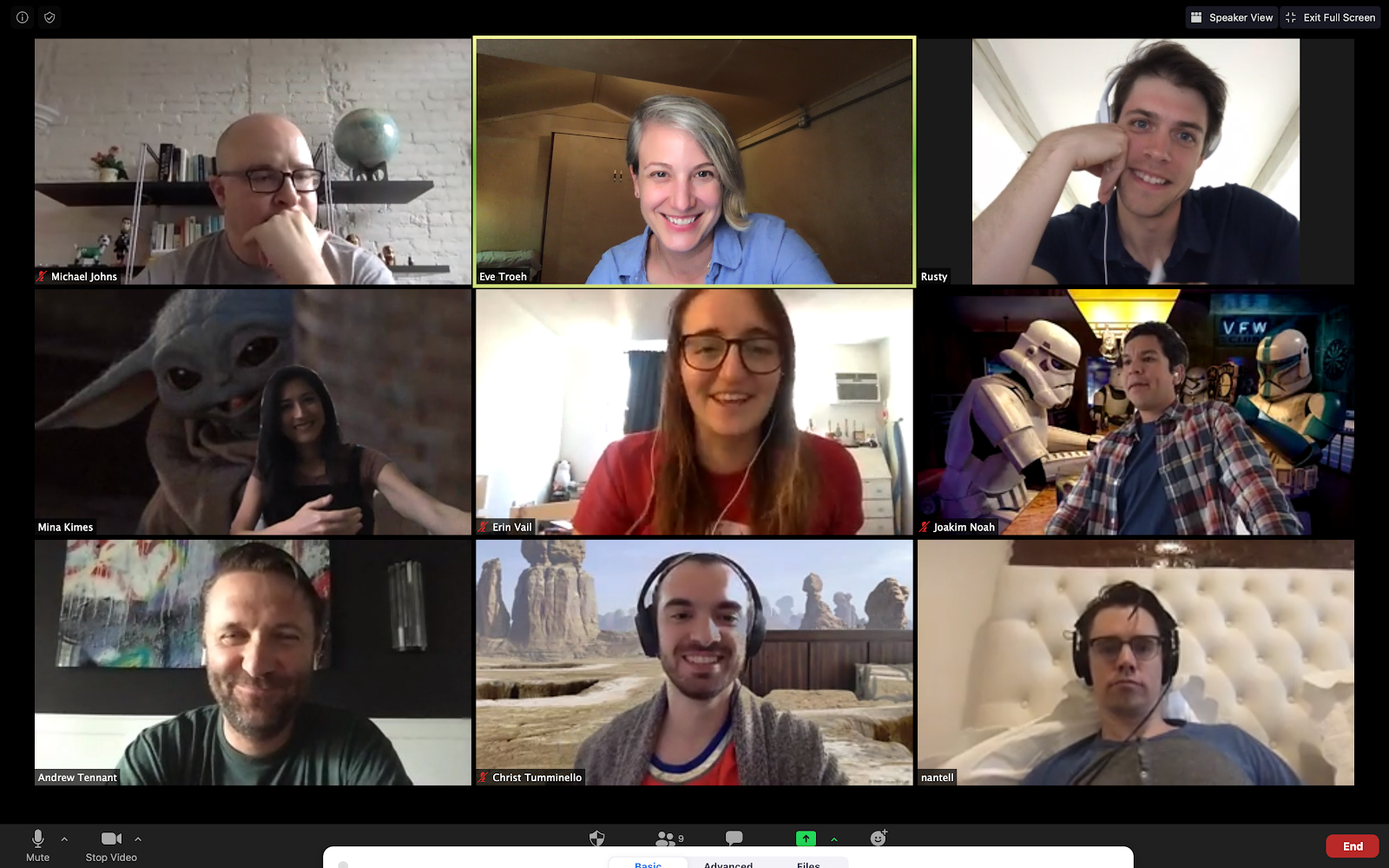Producing ESPN’s Daily Podcast Is a Team Effort
Since launching in 2019, ESPN Daily has been downloaded over 15 million times (as of May 31), averaging more than 585,000 listeners a month. Even as sports disappeared due to the COVID-19 pandemic, the show continued to grow, with the first quarter of 2020 bringing a 60 percent bump in listenership compared to the fourth quarter of 2019.
Ten people, including host Mina Kimes, spread across Los Angeles, New York, and ESPN’s headquarters in Bristol, Conn., bring it together.
Creating the show, which mixes breaking news with narrative storytelling and pinballs between sports throughout each week, is a serious undertaking. Ten people, including host Mina Kimes, spread across Los Angeles, New York, and ESPN’s headquarters in Bristol, Conn., bring it together.
Senior editorial producer Eve Troeh helps keep everything on track. Having previously worked in general news, including eight years at Marketplace, she’s also learning just how unpredictable the world of athletics can be. Troeh recently sat down with me to offer a behind-the-scenes peek at one of the world’s biggest sports podcasts. The following conversation has been edited for clarity and length.
How does ESPN Daily choose which topics will be discussed on the show?
We want to highlight and heighten the strongest reporting and narratives from around ESPN and—even more broadly—from the world of sports. Every day, our listeners know if they press “play” on our podcast they’ll get smarter, get the inside story, feel delighted, and even emotionally moved by the best stories in sports. With that as our mission, we keep a constant matrix of options in play, and we talk as a team to decide on the best story we can tell, to best serve the audience, on any given day.
We keep an eye on the sports calendar, so on a big game day we like to have a feature ready to go for listeners to enjoy before the event. We love to give listeners something that can improve their experience when they’re watching a game, like the amazing backstory on a player that helps them see that athlete differently, or a defense strategy that’s gaining popularity. We’re not a recap show, so our Monday shows may look at an outcome from the weekend and spin it forward—break down what it means for the league, the player, the team.
We’re in constant contact with ESPN editors about what writers are working on, from big feature stories—like our “NBA Heist” episode based on a story by Kevin Arnovitz about a fascinating scandal on the Sacramento Kings, or Dave Fleming’s look at the NFL combine and scrutinizing the way quarterback hand size is used as a metric. Then there are athlete profiles, like E60’s exclusive, year-long reporting project—with Stephania Bell—on QB Alex Smith’s grueling leg injury and recovery, or Wright Thompson’s hard-won interview with super pitcher Clayton Kershaw. ESPN reporters get inside access and “take you there” in a way that’s unparalleled. We love to talk to them about their reporting, and structure Mina’s interviews with them in a way that presents their work in a whole new way.
And we draw from ESPN’s amazing on-air talent. Doris Burke. Mel Kiper. Scott Van Pelt. Jalen Rose. Adam Schefter. Michael Wilbon. These names make great guests for us on the topics they know best, and you won’t find sharper analysis anywhere. We love to have them on whenever it fits—Doris giving us a mid-season NBA update, or Jalen Rose on playing against Michael Jordan around The Last Dance docuseries.
Mina Kimes is heavily involved in editorial decisions, and it’s usually a mid-week meeting where we hash out a game plan for the following week, with an understanding that we’ll totally change those plans if news requires it. Our brain trust includes people who know ESPN inside and out, like our executive producer Andy Tennant, myself, and our other senior manager Michael Johns, and our team of four producers, who pitch ideas as well.
How far in advance do you plan, and how late have you had to switch gears for a show?
We plan some things weeks in advance based on the sports calendar, and then get more granular about guests as things get closer. For NFL Draft week, for example, with no live sports going due to the coronavirus pandemic, we wanted to double down on draft coverage. So we sketched out a full five days of shows. That included ESPN writers diving deeper on features they’d written about players expected to go early in the draft—Senior Writer Liz Merrill on Jerry Jeudy and Bengals reporter Ben Baby on Joe Burrow. And then episodes with ESPN talent like Mel Kiper and Mike Golic Jr. to offer insights on the biggest storylines—in advance of the draft and right after the first round.
When we switch gears it’s usually because news breaks, like the Astros scandal unfolding early in the life of the podcast in fall 2019. We had ESPN’s Jeff Passan on speed dial in the first weeks of the podcast launching to provide backstory and context in addition to the latest news. Our team was all en route to Miami for a week of Super Bowl coverage when we learned of Kobe Bryant’s sudden tragic death. We landed, booked a time to talk to the amazing Ramona Shelburne, and then pulled an all-nighter to produce a show on her initial reporting of the accident. Same for the night the NBA shut down its season due to COVID-19. We recorded with ESPN’s Tisha Thompson close to midnight Eastern time for our episode the next day.
How do you assess what will make a good show topic?
We think of ourselves as a narrative and news podcast, so when we can overlap those two things that’s when we’re at our best. On the narrative side, we’re looking for a story that starts in a place, or with a person, and then takes us somewhere, tells us something we didn’t know, leaves us wanting to tell your friends or co-workers, “I heard this amazing story!” As, say, LSU was heading into the CFC and people were seeing and hearing more of coach Ed Orgeron (and his amazing gravel-y voice) we just knew that everyone would be talking about him and want to know more about him. ESPN’s David Hale had all these amazing anecdotes about him that we definitely felt people would want to hear and they’d remember. So, when thinking about how to cover the college football championship, the process is something like: who or what do people want and need to know more about? And who can we have on to tell those stories?
What have you learned since the show started that has affected how you plan shows?
There’s a lot of listening on Fridays, we’ve seen, so we like to have strong pieces there that either show off great storytelling or tie into something big happening over the weekend. Monday we like to start the week with something more news-y. During NFL season that meant late nights for analysis of the weekend’s games and a look ahead to the week’s games about to happen. Mid-week often feels like a good place for more evergreen features that perhaps aren’t pegged to a game. But of course that can all change if news breaks. One of the biggest lessons we’ve learned is that a great story can perform well no matter the day. Over the 2019 Christmas holiday we had Sarah Spain re-tell her amazing 2018 story on how Chiefs running back coach Deland McCullough found his birth father, and this was a week that people were not commuting, and it wasn’t a news-related story in any way, really, and it’s one of our top episodes in terms of downloads so far.
What advice would you have for young podcasters who want to keep coming up with interesting show ideas?
For people getting started—writers, podcasters, anyone in media—I suggest looking for ideas in places that are under the radar. Look in the corners and backgrounds, look for details that others might skip over and make it your mission to dive into them. Anomalies. Unsung heroes. Sure, everyone would like to interview superstar athletes, but you work your way up to assignments like that by showing you can find great stories anywhere. Be curious about your own world. Read local newspapers (it’s important)! Notice that kid who’s shooting hoops every night at midnight, what’s her story? Who’s the superfan who’s at every game and what’s behind that shirt he always wears?
How is planning for a sports show different from other shows you’ve worked on?
Coming to ESPN from general news—local and national broadcast news—I underestimated how “newsy” sports would be. I thought, hey, you know which teams are playing each other and you know when, so you just plan around that, right? I was not prepared for the ways that, say, an injury means that a player you wanted to profile will no longer be on the field, and you might have missed your window to talk about him. Or how news from a totally different corner of sports can throw a wrench in your plans to run, say, a feature on NHL dentists as the hockey season starts. It requires that our team be very nimble, while at the same time taking the time to carefully craft bigger-picture, longer-term narratives that are slightly more news-proof.

The ESPN Daily team recently took a break from one of their extended Zoom planning meetings to celebrate the birthday of producer Erin Vail (center), who happens to be a Star Wars fan.
The full staff list:
Mina Kimes
Eve Troeh
Mike Johns
Andy Tennant
Chris Tumminello
Ryan Nantell
Alex Hyacinthe
Erin Vail
Steve Martin
Not pictured: Alex Hyacinthe, Michael Baltierra
(Top photo: Bristol, CT – October 19, 2016: Photo of the ESPN campus Photo by Joe Faraoni / ESPN Images)




Comments